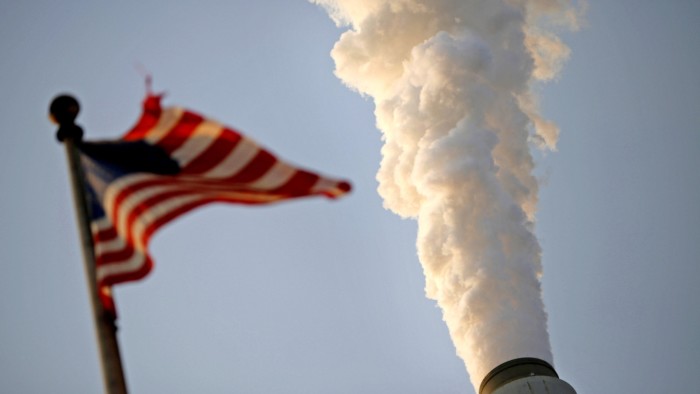This article is an on-site version of our Moral Money newsletter. Premium subscribers can sign up here to get the newsletter delivered three times a week. Standard subscribers can upgrade to Premium here, or explore all FT newsletters.
Visit our Moral Money hub for all the latest ESG news, opinion and analysis from around the FT
Welcome back. US shale oil producers are set to cut back production, ending an extraordinary run of booming output. Reasons include rising costs and falling crude prices due to increased production by Opec+ nations.
One thing we can safely rule out as a key factor is climate-related pressure from big US asset managers, who have gone conspicuously quiet on green issues. And even at the peak of their environmental enthusiasm, they were having a decidedly limited effect on emission reductions — according to their own lawyers.
CLIMATE ACTION
Did US asset managers’ climate policies have any impact?
At a federal court in eastern Texas, an odd case is under way.
On one side, Republican attorneys-general from 13 states argue that the climate strategies of the country’s biggest asset managers had a powerful effect, at least in the US coal industry.
On the other, the asset managers themselves assert what their critics in the green movement have been alleging all along: that their engagement with the fossil fuel sector has been so muted that it has had minimal real-world impact.
The case is a stark illustration of the political onslaught against financial sector climate action in the US — and of how limited that action always was.
On Thursday, the federal government threw its weight behind the states’ claim that BlackRock, Vanguard and State Street breached antitrust law by pressuring US coal companies to reduce production in pursuit of climate goals.
“The president has declared a national energy emergency,” said Abigail Slater, assistant attorney-general of the Department of Justice’s antitrust division. “We need competition in coal production now more than ever.”
The thrust of the complaint — which is now backed by the justice department and the Federal Trade Commission — is as follows.
Starting about five years ago, the big three asset managers started making bold public statements about climate action, pledging to align their investments with the Paris Agreement goal of keeping global warming well below 2C. They joined the Net Zero Asset Managers initiative and (except Vanguard) Climate Action 100+, two coalitions whose members committed to lowering financed emissions in support of net zero goals.
Between them, the three asset managers had aggregate stakes of up to 34 per cent in the US’s biggest listed coal producers, whom they allegedly pressured to cut output. As a result, the complaint argues, the companies’ coal production fell between 2019 and 2022, even as prices rose. Sector-wide profits increased, boosting the asset managers’ investment returns at the expense of US energy users.
The defendants’ lawyers have filed a blistering response — which is also an unflinching demolition of the idea that these asset managers have been playing a leading role in lowering carbon emissions.
The 2050 net zero goal that the asset managers publicly committed to would require a drastic fall in global coal usage. In its modelling of that scenario, the International Energy Agency estimated that global coal production would need to decline by 44 per cent just between 2022 and 2030.
Yet, as the asset managers’ lawyers point out, the plaintiffs have shown no hard evidence that they pushed coal companies to reduce output. Instead, their climate-related engagement with these companies was overwhelmingly focused on asking them to provide more information on the risks they faced around the energy transition.
They’ve frequently voted for directors of companies that were expanding coal production, and against board members of producers that were cutting back. And while US-listed companies’ coal output shrank in 2020 amid the disruption of the Covid-19 pandemic — having been in steady decline for more than a decade — it then rose for the next two years, when the alleged conspiracy was supposedly in full swing.
In other words, while they promised to pursue long-term emissions reductions — both independently and by signing up to climate coalitions — the asset managers have been doing very little to achieve that end, at least in US coal.
As the political heat around this issue has risen, the big three asset managers have slashed their support rate for climate-related shareholder proposals, and withdrawn along with many US peers from CA100+ and the now-suspended NZAM (BlackRock’s international business remains part of the former).
With the Trump administration now openly deploying the justice department to promote its pro-fossil fuel agenda, these asset managers’ public enthusiasm for climate action will not resurface any time soon. But — as their own lawyers have made clear — it’s not clear that it was making much difference in the first place.
Smart reads
Hungry for a fight Robert F Kennedy Jr, Donald Trump’s controversial health secretary, is setting up a landmark battle with Big Food.
Almost on track The EU is set to reduce its carbon emissions 54 per cent from 1990 levels from 2030 — close to its goal of a 55 per cent drop.
Price war Share prices of Chinese electric car companies tumbled today after market leader BYD announced price cuts.
Recommended newsletters for you
Full Disclosure — Keeping you up to date with the biggest international legal news, from the courts to law enforcement and the business of law. Sign up here
Energy Source — Essential energy news, analysis and insider intelligence. Sign up here
